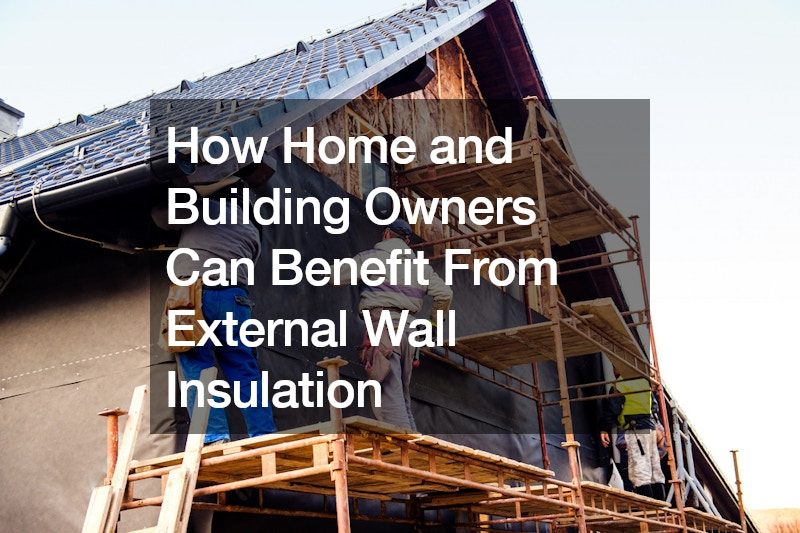In an era where energy efficiency is paramount and environmental concerns are at the forefront, external wall insulation (EWI) presents a compelling solution for home and building owners. This method of insulation involves adding a protective layer to the exterior walls of a building, significantly enhancing its thermal performance. The benefits of EWI are manifold, ranging from substantial energy savings to improved living conditions and environmental sustainability.
This article delves into the various advantages of external wall insulation and why it is an investment worth considering for property owners.
1. Enhanced Energy Efficiency
One of the most significant benefits of external wall insulation is its ability to drastically improve a building’s energy efficiency. Buildings lose a substantial amount of heat through their walls. By adding an insulating layer to the exterior, heat loss is minimized, ensuring that less energy is required to maintain a comfortable indoor temperature. This reduction in energy consumption translates to lower heating bills, offering substantial financial savings over time. In colder climates, the savings can be particularly notable, making EWI an economically sound investment.
2. Improved Indoor Comfort
External wall insulation contributes to a more comfortable indoor environment. By reducing heat loss in the winter and keeping the interior cooler in the summer, EWI helps maintain a stable indoor temperature throughout the year. This consistent thermal performance enhances the comfort of occupants, reducing the need for excessive heating or cooling. Additionally, EWI can help eliminate cold spots and drafts, further contributing to a pleasant living or working space.
3. Environmental Benefits
Incorporating external wall insulation is a proactive step towards environmental sustainability. Lower energy consumption directly correlates with reduced carbon emissions, which are a significant contributor to climate change. By opting for EWI, property owners can significantly lower their carbon footprint. Furthermore, the materials used in EWI systems are often designed to be environmentally friendly and sustainable, adding another layer of eco-consciousness to the decision.
4. Noise Reduction
Another noteworthy advantage of external wall insulation is its ability to reduce noise pollution. The insulating materials used in EWI systems can act as a sound barrier, dampening external noises and creating a quieter indoor environment. This benefit is particularly valuable for properties located in noisy urban areas or near busy roads. Enhanced sound insulation contributes to better quality of life, promoting peace and tranquility within the home or building.
5. Increased Property Value
Investing in external wall insulation can significantly enhance the market value of a property. Energy-efficient homes are increasingly in demand, and buyers are willing to pay a premium for properties that offer reduced energy bills and improved comfort. EWI not only improves the aesthetic appeal of a building but also provides a tangible, long-term benefit that can be a strong selling point. Moreover, the improved structural integrity and protection against weathering offered by EWI can further boost property value.
6. Extended Building Lifespan
External wall insulation provides an added layer of protection to a building’s structure, shielding it from adverse weather conditions and environmental wear and tear. This protective layer can help prevent issues such as dampness, mold, and structural damage, thereby extending the lifespan of the building. By maintaining the integrity of the building’s exterior, EWI reduces maintenance costs and ensures the property remains in good condition for longer.
7. Versatile Aesthetic Options
External wall insulation offers an opportunity to enhance the aesthetic appeal of a property. With a variety of finishes and colors available, EWI can be customized to suit the architectural style and personal preferences of the property owner. Whether aiming for a modern look or a traditional facade, EWI can be tailored to meet design requirements while providing the functional benefits of insulation. This versatility makes it an attractive option for those looking to improve both the performance and appearance of their buildings.
8. Government Incentives and Grants
In many regions, governments and local authorities offer incentives and grants to encourage the adoption of energy-efficient measures, including external wall insulation. These financial incentives can significantly offset the initial cost of installation, making EWI more accessible to property owners. By taking advantage of these programs, owners can reduce their upfront investment while reaping the long-term benefits of improved energy efficiency and reduced utility bills.
9. Compliance with Energy Regulations
With increasing emphasis on energy efficiency and sustainability, many regions have implemented stricter building regulations. External wall insulation can help property owners comply with these regulations, avoiding potential fines and ensuring that their buildings meet the required energy performance standards. Compliance not only demonstrates a commitment to sustainability but also future-proofs the property against evolving regulatory requirements.
Conclusion
External wall insulation offers a myriad of benefits that make it a worthwhile investment for home and building owners. From enhanced energy efficiency and indoor comfort to environmental sustainability and increased property value, EWI addresses a range of practical and financial considerations. By protecting the building’s structure, improving aesthetics, and potentially benefiting from government incentives, external wall insulation stands out as a comprehensive solution for modern property owners. Embracing EWI is not only a step towards a greener future but also a smart financial decision that pays dividends in comfort, savings, and property value.
.





